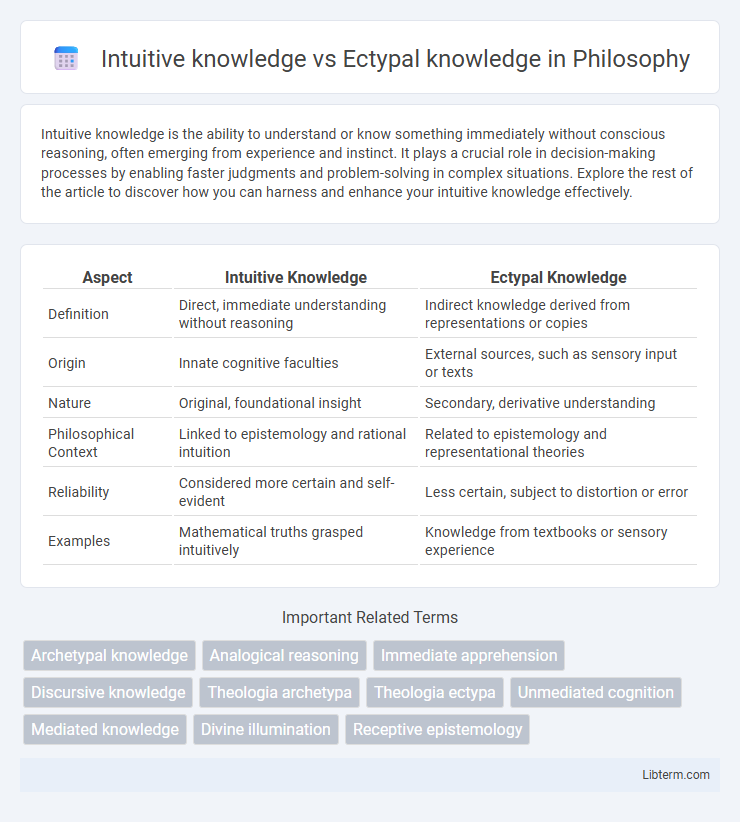Intuitive knowledge is the ability to understand or know something immediately without conscious reasoning, often emerging from experience and instinct. It plays a crucial role in decision-making processes by enabling faster judgments and problem-solving in complex situations. Explore the rest of the article to discover how you can harness and enhance your intuitive knowledge effectively.
Table of Comparison
| Aspect | Intuitive Knowledge | Ectypal Knowledge |
|---|---|---|
| Definition | Direct, immediate understanding without reasoning | Indirect knowledge derived from representations or copies |
| Origin | Innate cognitive faculties | External sources, such as sensory input or texts |
| Nature | Original, foundational insight | Secondary, derivative understanding |
| Philosophical Context | Linked to epistemology and rational intuition | Related to epistemology and representational theories |
| Reliability | Considered more certain and self-evident | Less certain, subject to distortion or error |
| Examples | Mathematical truths grasped intuitively | Knowledge from textbooks or sensory experience |
Understanding Intuitive Knowledge
Intuitive knowledge represents direct, immediate understanding gained through experience or innate insight without conscious reasoning, contrasting with ectypal knowledge, which is a derivative or imitative form of understanding based on external representations. This form of cognition relies on subconscious pattern recognition and holistic perception, allowing individuals to make rapid, often accurate judgments. Emphasizing intuitive knowledge enhances decision-making in complex or uncertain situations where analytical methods are limited or time-constrained.
Defining Ectypal Knowledge
Ectypal knowledge refers to understanding derived from representations or copies of reality, rather than direct or intuitive experience. Unlike intuitive knowledge, which is immediate and self-evident, ectypal knowledge depends on mental images, concepts, or external information sources. This type of knowledge enables individuals to grasp ideas indirectly through symbols, descriptions, or models.
Core Differences: Intuitive vs Ectypal Knowledge
Intuitive knowledge is an immediate, direct understanding based on personal insight or experience, often unconscious and holistic, whereas ectypal knowledge is a mediated, derivative form of knowledge that reflects an imperfect copy of an original or archetype. The core difference lies in their origin: intuitive knowledge arises internally and spontaneously, while ectypal knowledge depends on external representations or imitations. This distinction highlights intuitive knowledge's originality and directness compared to ectypal knowledge's dependence on symbolic or secondary sources.
Origins and Sources of Intuitive Knowledge
Intuitive knowledge originates from innate cognitive processes and subconscious mental patterns, rooted in evolutionary adaptation and neurological structures that enable rapid understanding without deliberate reasoning. This type of knowledge derives from direct internal experiences, such as instincts and immediate perceptions, contrasting with ectypal knowledge, which is mediated through external representations or mental models of reality. Neuroscientific studies reveal that intuitive cognition often involves the interplay of the limbic system and prefrontal cortex, highlighting its biological basis and distinct source from learned or symbolic knowledge systems.
The Acquisition of Ectypal Knowledge
The acquisition of ectypal knowledge involves the process of receiving and understanding external representations or copies of reality, contrasting with intuitive knowledge that arises from direct, innate awareness. Ectypal knowledge is obtained through sensory experience, learning, and interaction with the environment, relying on mental models and abstract concepts that mirror the objects or phenomena studied. This type of knowledge acquisition emphasizes perception, interpretation, and cognitive processing of external data rather than immediate, self-evident insight.
Epistemological Implications of Both Types
Intuitive knowledge, rooted in immediate, non-inferential awareness, challenges traditional epistemological frameworks by emphasizing direct, often subconscious understanding that defies standard propositional analysis. Ectypal knowledge, as a derivative or representational form of cognitive content, raises questions about the fidelity and authenticity of knowledge transmission and the role of mediation in shaping epistemic justification. The tension between these types foregrounds critical debates about the sources of justification, the nature of epistemic access, and how knowledge claims can be validated or refuted within both empirical and rationalist paradigms.
Applications of Intuitive Knowledge in Everyday Life
Intuitive knowledge enables quick decision-making by drawing on subconscious experiences and pattern recognition, often used in driving, cooking, and social interactions. It supports problem-solving where explicit reasoning is impractical, such as recognizing emotions or assessing risks instantly. This type of knowledge enhances creativity and adaptability, making it essential for navigating complex, dynamic environments efficiently.
Limitations of Ectypal Knowledge
Ectypal knowledge, derived from imperfect representations or copies of reality, is limited by its inherent distortions and lack of direct experience, resulting in reduced accuracy and reliability. This type of knowledge often fails to capture the full complexity and nuance of the original subject, leading to potential misunderstandings or incomplete insights. Unlike intuitive knowledge, which is immediate and holistic, ectypal knowledge depends on external mediations that compromise its depth and authenticity.
Interplay and Integration of Both Knowledge Types
The interplay between intuitive knowledge and ectypal knowledge fosters a comprehensive cognitive framework where intuitive insight offers spontaneous understanding while ectypal knowledge provides structured, representational data. Integrating both knowledge types enhances decision-making accuracy by combining subconscious pattern recognition with conscious analytical reasoning. This synthesis enables adaptive learning and problem-solving across complex, dynamic environments.
Theological and Philosophical Perspectives
Intuitive knowledge in theological and philosophical perspectives represents immediate, non-discursive understanding of divine truths or metaphysical realities, often seen in mysticism and direct spiritual experience. Ectypal knowledge, contrastingly, refers to derivative or representational knowledge that is mediated through concepts, doctrines, or sensory experiences, grounded in human cognition and fallibility. The distinction highlights debates on the nature of epistemology in theology, where intuitive knowledge aligns with unmediated divine insight, and ectypal knowledge encompasses learned, interpretative comprehension of sacred mysteries.
Intuitive knowledge Infographic

 libterm.com
libterm.com